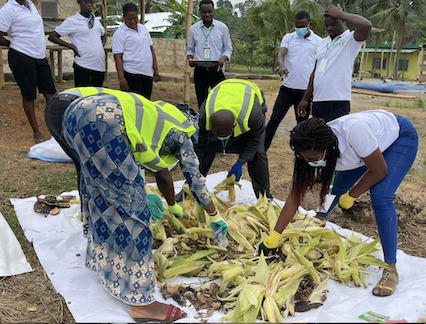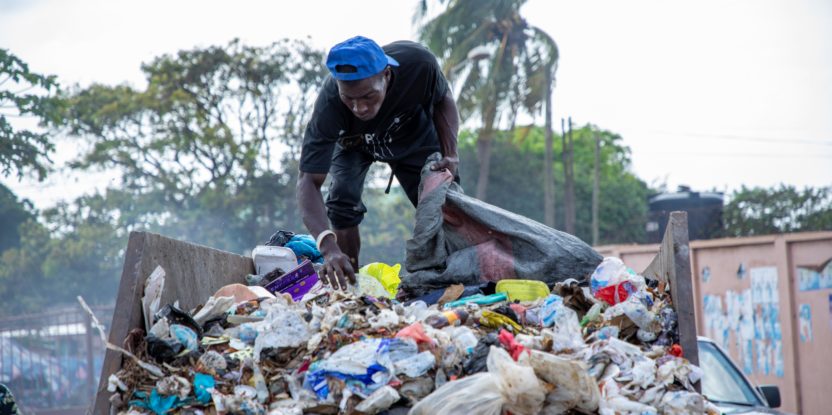Betty Osei Bonsu is project coordinator of the Green Africa Youth Organization based in Accra.
Last year, I had the privilege of training youth and women living in a mining area on how to use existing resources for sustainable products like sawdust and organic waste, compost and cocoa husks into bath soap.
Dependent on illegal mining activities, which destroy their water supply, biodiversity and increase the risk of illness, about 80 percent of youth voiced grievances regarding unreliable communication from leaders on job opportunities, citing this as a reason why they decided to fend for themselves in their own way despite the consequences.
The green recovery solutions resulting from these community activities did not only contribute to diversify income from recoverable waste, but also promoted community inclusion in sustainability matters. Global economic growth, requires valuing and investing in nature-based biological resources as well as communities who serve as the custodians.
These ideas feed into the concept of a bioeconomy due to their use of biological resources to supply products, processes, and services in all economic sectors in the context of a sustainable economic system using knowledge-based production.- Food system summit 2021.
According to The Convention on Biological Diversity strategy for Ghana, biological resources are under serious threat, and urgent action is required to avert negative consequences. Lack of coordination across policymaking and implementation agencies at the global, regional, national, and local levels is also a major impediment to effective management of biological resources.

Betty Osei Bonsu leading a team in the preparation of compost from household waste.
Bioeconomy strategies reduce reliance on natural resources, transforming manufacturing, and promoting sustainable production of renewable resources. Although the bioeconomy solution is considered a model for industry and economic growth, leaders have not given it their full attention, leaving a great deal of potential left untapped — untapped potential stored within millions of tons of biological waste and residual materials is disposed of daily into the environment.
Youth and resources go hand in hand because youth are the key to sustainability. The role of youth in bioeconomic solutions is to bridge the gap to strategically ensure intergenerational equity, since youth will bear the biggest burden of climate change.
Youth inclusion in the bio-based economy raises questions of environmental sustainability, human survival, social justice, and human rights, where social inclusion is defined as a creative approach to improving the lives of the most vulnerable.
Green Africa Youth organization in its efforts to effectively manage waste, generate income from materials considered to be waste and build the capacity of waste workers to inculcate recycling into their operations, is working with communities to achieve zero waste. This strategy was to promote inclusion in designing the project in line with community needs and opinions through consultative meetings. Also, part of this effort is to ensure informal waste workers are recognized by the public and institutions as key to waste management.
A live interview conducted with some of the waste pickers and collectors following the celebration of the waste pickers day served as a case study. They shared their plight on the stigmatization they face on a day-to-day basis as waste collectors and how they are even denied health care due to their appearance. Inclusion should not only be youth-centered but transcend all individuals within communities. Surprisingly, 50 percent of the waste workers engaged were youth.
Agenda 21 identifies youth as one of the nine major civil society groups with the right and responsibility to participate in sustainable development. Again, the U.N. Framework Convention on Climate Change (UNFCCC), in its Article 6 on Education, Training and Public Awareness, urges governments to develop climate change education and training programs to educate, empower and engage all stakeholders, including youth. Youth are therefore the major group for effective engagement in creating and implementing decisions on climate change and issues of environmental sustainability or environmental policies.
Youth-led campaigns directed toward leaders on boosting resource efficiency and the use of renewable raw materials while transforming the economic system into one which favors a circular and climate-neutral environment. The shift from a linear to a circular economy will generate new business models in all sectors of production, including the bio-based world. Despite the fact that bio-economic solutions address global climate concerns, a gap exists in raising awareness with the public.
We are currently in an era where managing resources is seen as poverty, and mismanagement of resources is seen as riches. If I could go back as a 7-year-old to my childhood community, I would ask my leaders why they hid the truth from me.
The truth, that I have the right to decide my future;
The truth, that I have the right to protect my natural resources;
The truth is that I am not just a child but a meaningful changemaker;
Gender inequality remains a problem rendering inclusion incomplete within community settings. In certain parts of Ghana, women are not allowed to own lands or contribute to decision making. They are assigned to the kitchen and daily chores.
The need to operationalize social inclusion in the bioeconomy will not only ensure sustainability, with gender inclusion, but trans-sustainability — sustainability that will be transferred from one generation to another.
The bioeconomy solution concepts present innovations of understanding economic systems, with a focus on market uptake of greener solutions based on less intensive resource use. Adherence to this bio evolution, bioeconomy projects such as agribusiness, forestry, fisheries and aquaculture are fields in which youth should be massively encouraged to participate.
Our leaders have always been the ones deciding our future, it’s time they hand over and trust us to make the changes we want to see.
We want you to share Forests News content, which is licensed under Creative Commons Attribution-NonCommercial-ShareAlike 4.0 International (CC BY-NC-SA 4.0). This means you are free to redistribute our material for non-commercial purposes. All we ask is that you give Forests News appropriate credit and link to the original Forests News content, indicate if changes were made, and distribute your contributions under the same Creative Commons license. You must notify Forests News if you repost, reprint or reuse our materials by contacting forestsnews@cifor-icraf.org.
